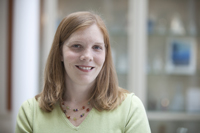Have you ever considered joining a walk/run/swim or other athletic event to benefit a cause that has special meaning to you? I never thought that participating in my first event would become even more personal, and I didn’t anticipate that the bonds I formed would help me deal with my own issues.
This is the first of a four-part series on my experiences at the Avon Walk for Breast Cancer.
Part 1: Humbled by our beginnings
In 1992, my mom was first diagnosed with breast cancer. That spring, my sisters and I joined her in what was then a new form of self-empowerment and awareness-raising: the DC Race for the Cure (now known as the Susan G. Komen Global Race for the Cure). For the first time, we donned oversized t-shirts, pinned bibs and slathered sunscreen, and walked the streets of Washington, D.C., cheered on by a network of volunteers, activists, and other supporters. We didn’t know we were trendsetters then, but I do remember feeling something new about my mother’s disease and struggle to regain wellness. I think these early walks planted a seed for something I came to better understand years later.
It’s complicated. The walks are a celebration of life and yet a memoriam for those we have lost. What is felt by one person in one family expands to a network of patients, survivors, care-providers, and fundraisers. They inspire us to fight another day, but remind us of how far we need to travel. My own journey didn’t end with that first event in 1992 in honor and celebration of my mother. It became more personal when I was diagnosed with breast cancer at age 23.
I’ve grown from being a 10-year-old daughter of someone grappling with the disease and its aftermath; to being a patient and then a survivor myself, and now dedicating my work and my own need to make a difference in the world to eradicating breast cancer.
Since that first walk in 1992 with my mother and sisters, I have chosen to participate in a couple of walks, runs, and fundraisers benefiting breast cancer yearly. It has become one of the ways I have chosen to get and stay involved. Surprisingly, the year after I became a survivor was the most challenging for me to participate in events. This was less to do with the physical side-effects from treatment but rather the emotional complexity that I was grappling with -- I had become the new face of breast cancer and was no longer just a supporter. Nothing in my previous 23 years had prepared me to deal with the shocked and sympathetic looks and intrusive questions that comes with someone so young having breast cancer. Compete strangers would ask questions like, how old was I at diagnosis; did I have a family history of breast cancer; was I BRCA positive; did I smoke; or my personal favorite- had I ever used oral contraceptives.
The good news is the further away I moved from my initial diagnosis, the more comfortable I eventually became with being part of this group. The same experiences that I viewed as devastating at 23 have now truly given me perspective and a platform that allows me to hopefully provide strength to others.
Next...
Part 2: Walk The Talk
Part 3: Bonds that Bring Us Closer
Part 4: Why I Walk
